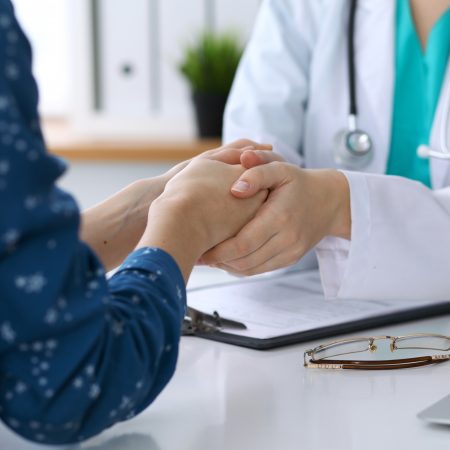LAS VEGAS – One notable finding that Dr. Carla L. Fisher and her colleagues discovered during their research on medical acupuncture at Nellis AFB was the feeling of greater trust between patients and physicians.
“Acupuncture really changed that relationship,” Fisher said. “It warrants that doctors take more time, and they get to know their patients on a more intimate level.”
Her interviews with both patients and providers revealed that they both believed acupuncture cultivated and enhanced a sense of trust in their relationship, she added.
Fisher, an Assistant Professor at the University of Florida, is a health communication expert and a member of the interdisciplinary Acus research team.
Her work focuses on how communication between patients and providers as well as within the family impacts on our health as individuals and as a society.
“How we communicate plays a critical role in health outcomes,” she said.
During the summer and fall of 2016, Fisher made two trips to the Acus flagship program at Nellis AFB. With her colleague Dr. Christy Ledford of Uniformed Services University of the Health Sciences (USUHS), they interviewed a number of patients and physicians about their perceptions and experiences of medical acupuncture as part of an Acus-funded utilization study.
They investigated the different ways in which providers talked to their patients about acupuncture and asked what communication strategies they thought were the most effective in getting patients to try and maintain acupuncture treatment.
Fisher and her colleagues found doctors were very careful with their diction or the language they used to describe acupuncture to their patients, communication decisions driven by the patient’s preferences.
“Some physicians did not use the language of ‘Eastern’ medicine because they believed it could turn patients off or challenge their beliefs,” she said. “Other providers found a way to blend the Western and Eastern explanations in a way they perceived enhanced patients’ willingness to try acupuncture.”
It was especially important for patients to hear from the physicians that the treatments worked, Fisher noted.
They also found that the physical, mental, and social health outcomes of medical acupuncture were positive and inter-related. Fisher described this happening with patients coping with chronic pain.
Patients start acupuncture, their pain decreases, they get off narcotics, they’re in a better mood, their relationships improve at home and at work, and their wellbeing rebounds overall.
“One of the big draws of acupuncture, in light of the opioid crisis, is that many of these patients have been told their only option is surgery,” she said. “They are very excited to have a noninvasive treatment with no side effects as an alternative.”
“Lots of patients are getting off narcotics entirely,” she added.
Fisher noted that in particular, “Oftentimes patients in chronic pain or with other chronic issues are willing to try anything.”
Acus Foundation’s 300-hour training program in military medical acupuncture gives health care providers an extensive foundation in the fundamentals of auricular, scalp, and body acupuncture, also also teaches the theory behind the protocols so that physicians can creatively design and tailor their treatments to each individual patient.
Fisher and the Acus research team already have presented their findings based on this utilization study at notable research conferences, have several peer-reviewed under review for publication, and will be submitting additional manuscripts for publication in the coming months.


